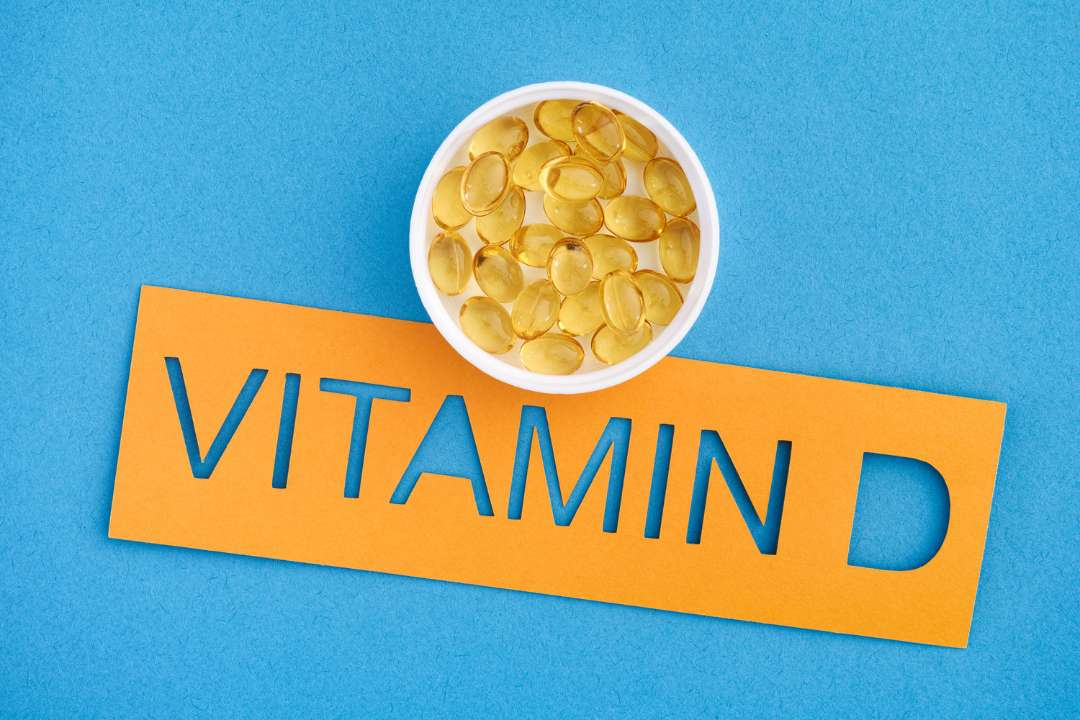Vitamin D often hailed as the 'Sunshine Vitamin', plays a pivotal role in our health and wellbeing. It is not just a nutrient; it's a necessity. From bolstering bone health to fortifying our immune system, Vitamin D stands out in the realm of vitamins. Let's dive deep into Vitamin D, unearthing its benefits, sources, and more.

Vitamin D: More Than Just Bone Health
While Vitamin D is universally acknowledged for its essential role in maintaining bone strength, its benefits extend far beyond. This vital nutrient is a powerhouse of health advantages that touches upon various physical and mental wellbeing aspects.
Muscle Function and Strength: Vitamin D is crucial for muscle development and function. Adequate levels of this Vitamin are associated with improved muscle strength, potentially reducing the risk of falls and fractures, especially in older adults.
Immunity Booster: Vitamin D plays a significant role in the immune system. It helps modulate the body's immune responses, defending against infections while ensuring the immune system does not overreact, which can lead to autoimmunity.
Mental Health Ally: Emerging research points to a connection between low Vitamin- D levels and mental health, particularly in mood regulation. Low levels of Vitamin D have been linked to an increased risk of depression and mood swings.
Heart Health: Evidence suggests that Vitamin D may have heart-protective effects. Adequate Vitamin D levels are linked to a lower risk of heart disease, as it may play a role in controlling blood pressure and preventing artery damage.
Diabetes Management: Vitamin D might influence the body's insulin response and glucose metabolism, thereby playing a role in diabetes management and prevention.

Sunlight and Supplements: Navigating Vitamin D Sources
Sunshine is synonymous with Vitamin D, but what about those with limited sun exposure? The body's ability to produce Vitamin D from sunlight varies depending on time of day, geographic location, skin pigmentation, and age. For many, especially in less sunny climates, dietary sources and supplements become essential.
Dietary Sources: Fatty fish like salmon and mackerel are excellent natural sources of decreased vitamin D. Other sources include egg yolks, cheese, and Vitamin D-fortified foods such as dairy products, orange juice, and cereals.
Supplements: Vitamin D supplements can help fill the gap when natural sources are insufficient. Vitamin D supplements come in two forms: D2 (ergocalciferol) and D3 (cholecalciferol). D3, typically derived from animal sources, is the more potent form recommended for those with a deficiency.
Safe Sun Exposure: Moderate sun exposure is another way to boost Vitamin D levels. However, balancing the need for sun exposure with the risk of skin cancer is crucial. Dermatologists generally recommend short periods of sun exposure, avoiding peak sun hours.

The Silent Epidemic: Tackling Vitamin D Deficiency
Vitamin D deficiency is a global concern, often unnoticed until it manifests in serious health problems. It's a silent epidemic affecting a significant portion of the population, irrespective of age, gender, or ethnicity.
Recognising the Symptoms: Common signs include fatigue, bone pain, muscle weakness, mood changes, and frequent infections. These symptoms can be subtle and easily overlooked, making Vitamin D deficiency a tricky condition to catch early.
Risk Factors: Certain groups are at a higher risk, including those with limited sun exposure, older adults, people with darker skin, individuals with certain medical conditions like kidney or liver diseases, and those with a B.M.I. in the obese range.
Testing and Treatment: Diagnosing Vitamin D deficiency typically involves a simple blood test. Treatment includes supplementation, dietary changes, and lifestyle modifications like increased sun exposure. To work with healthcare professionals, those diagnosed with a vitamin D deficiency must create a personalised plan to restore and maintain adequate Vitamin D levels.
Preventive Strategies: Prevention strategies include regular sun exposure, consuming Vitamin D-rich foods, and considering supplements if you're at risk of deficiency. Regular health check-ups and awareness of the risk factors can also help in early detection and management.
In conclusion, Vitamin D's role in our health is multifaceted and profound. From ensuring strong bones to supporting immune function, mental health, and more, it's clear that this sunshine vitamin is essential for a healthy, balanced life. Ensuring adequate Vitamin D levels through diet, supplements, and sensible sun exposure is critical to reaping these health benefits and preventing the silent epidemic of Vitamin D deficiency.

Vitamin D and Immunity: A Strong Connection
Recent studies have significantly illuminated the role of Vitamin D in immune function. This connection is vital, particularly in the context of global health challenges. Vitamin D is not just a bystander in the immune system but an active participant.
Enhancing Innate Immunity: Vitamin D enhances the pathogen-fighting effects of monocytes and macrophages — white blood cells that are essential components of the immune defence — and decreases inflammation, which helps promote immune response.
Regulating Adaptive Immunity: Vitamin D plays a critical role in the adaptive immune system — the body's second line of defence. It helps regulate T-cells, which are essential for recognising and remembering pathogens.
Respiratory Infections: Evidence suggests that Vitamin D can reduce the risk of respiratory tract infections. Its role in the immune response to respiratory pathogens is an area of active research, particularly relevant in the era of COVID-19.
Autoimmune Diseases: Vitamin D deficiency has been linked to an increased risk of autoimmune diseases like Multiple Sclerosis and Type 1 Diabetes. Adequate Vitamin D levels may help reduce this risk by modulating immune responses.

Vitamin D for All Ages: Tailoring Your Intake
Different life stages require different amounts of Vitamin D. The body's demand for this nutrient varies as we age, and so does our ability to synthesise it from sunlight.
Infants and Children: The American Academy of Pediatrics recommends 400 IU of Vitamin D daily for infants and children. This is crucial for bone growth and immune system development.
Adults: For adults up to the age of 70, the recommended dietary allowance (R.D.A.) is 600 IU. Adequate Vitamin D is necessary for maintaining bone health and muscle function.
Elderly: Adults over 70 should increase their intake of oral vitamins to 800 IU daily. Ageing skin synthesises less Vitamin D from sunlight, and older people are at a higher risk of osteoporosis and falls.
Pregnant and Breastfeeding Women: An increased intake of 600-800 IU is recommended for pregnant and breastfeeding women to support fetal bone development and immune health.
Vitamin D and Chronic Diseases: A Preventative Approach
Emerging research suggests that maintaining adequate Vitamin D levels can be instrumental in preventing certain chronic diseases. Vitamin D's role in chronic disease prevention is multifaceted.
Cardiovascular Disease: Some studies suggest that Vitamin D may help reduce the risk of heart disease by influencing factors such as blood pressure and vascular stiffness.
Cancer Prevention: There is ongoing research into Vitamin D's potential role in reducing the risk of certain cancers, particularly colorectal, breast, and prostate.
Type 2 Diabetes: Vitamin D might influence the risk of developing Type 2 Diabetes, possibly through its effects on glucose metabolism and insulin sensitivity.
The Sunshine Vitamin and Mental Health
The role of Vitamin D in mental health is an area of growing interest. The potential impact of inadequate Vitamin D on mood disorders and cognitive function is significant.
Depression: Low levels of Vitamin D have been linked with an increased risk of depression. Supplementation of Vitamin D might be beneficial as a part of the treatment for depression, especially in individuals with known deficiency.
Cognitive Function: Evidence suggests that Vitamin D plays a role in cognitive health. Adequate levels might help in reducing the risk of cognitive decline and diseases like Alzheimer's, especially in the elderly.

Vitamin D in Pregnancy: Essential for Mother and Child
Pregnancy demands increased nutritional care, and Vitamin D is no exception. Adequate Vitamin D levels are critical for both maternal and fetal health.
Fetal Development: Vitamin D is crucial for the healthy development of the baby's bones, teeth, kidneys, heart, and nervous system.
Maternal Health: Adequate levels of Vitamin D during pregnancy are linked to a reduced risk of complications such as gestational diabetes, preeclampsia, and low birth weight.
Vitamin D and Weight Management: An Overlooked Factor
Can Vitamin D influence weight management? Research suggests a possible link between Vitamin D levels and body weight regulation.
Appetite and Metabolism: Vitamin D might play a role in regulating appetite and metabolism. Some studies have found that higher levels of Vitamin D are associated with a reduced risk of obesity.
Fat Storage: Vitamin D might influence how the body stores fat. Adequate Vitamin D levels may help reduce fat storage and promote a healthier body composition.
In conclusion, Vitamin D, a versatile nutrient, plays a crucial role in various aspects of health and wellbeing. Maintaining adequate Vitamin D levels cannot be overstated, from bolstering the immune system to ensuring mental and physical health across different life stages. A proactive approach to managing Vitamin D intake can contribute significantly to long-term health and disease prevention, whether through sunlight, diet, or supplements.
Vitamin D in the Elderly: Combatting Age-Related Decline
As our bodies age, they face unique challenges, including a decreased ability to produce Vitamin D. This fat-soluble Vitamin is crucial for maintaining healthy bones. Yet, older people often struggle with lower Vitamin D levels. Elderly individuals, especially those who have undergone gastric bypass surgery or suffer from conditions that limit fat absorption, may find it harder to maintain adequate Vitamin D status. This makes them susceptible to bone fractures and soft bones, conditions directly linked to insufficient Vitamin D. Therefore, it's essential for health professionals to monitor Vitamin D levels in older people and recommend Vitamin D supplementation or dietary changes to ensure they receive enough of this vital nutrient.

Vitamin D and Skin Health: Beyond Sun Exposure
While sun exposure is a well-known source for synthesising Vitamin D, its role in skin health extends beyond just Vitamin D production. Adequate Vitamin D levels may help maintain the skin's health, potentially reducing the risk of certain skin conditions. However, balancing the need for sun exposure with the risk of skin cancer is crucial. Health professionals often recommend moderate sun exposure to optimise Vitamin D production without increasing the risk of skin cancer. Vitamin D supplements and Vitamin D-rich foods like fatty fish and fortified foods can support skin health without excessive sun exposure.
Vitamin D and Cardiovascular Health: A Heart-Healthy Nutrient
Cardiovascular disease remains a leading cause of death globally, and research suggests that Vitamin D may play a role in maintaining a healthy heart. Studies have linked low Vitamin D levels with an increased risk of cardiovascular diseases. This fat-soluble Vitamin may influence heart health by affecting blood calcium levels, blood pressure regulation, and inflammation. Therefore, maintaining adequate Vitamin D levels through sun exposure, dietary intake, and supplements is essential for cardiovascular health. Health professionals often recommend a balanced vitamin intake to ensure sufficient Vitamin D levels without risking over-supplementation.
Understanding Vitamin D Metabolism
Understanding its metabolism is crucial to appreciating the importance of Vitamin D. Vitamin D is unique among vitamins because the human body can produce it when exposed to sunlight. Once synthesised in the skin or absorbed from the diet, Vitamin D undergoes two transformations in the body – first in the liver and then in the kidneys – to become the active form the body can use. This process is crucial for maintaining adequate Vitamin D levels and ensuring calcium absorption for bone health. Disorders in Vitamin D metabolism can lead to low Vitamin D levels, highlighting the importance of a well-functioning metabolic pathway for optimal health.
The Synergy of Vitamin D and Other Nutrients
Vitamin D doesn't work in isolation; it interacts synergistically with other nutrients, particularly calcium. This synergy is crucial for bone health, as Vitamin D aids in calcium absorption in the gut. Without enough Vitamin D, the body cannot absorb dietary calcium effectively, regardless of calcium intake. This relationship underscores the importance of maintaining balanced Vitamin D and calcium levels, especially in individuals at risk of bone diseases. Dietary sources like fatty fish, fortified foods, and supplements can help ensure adequate intake of these essential nutrients.
Vitamin D: Debunking Myths and Misconceptions
There are many myths and misconceptions surrounding Vitamin D. For instance, some believe that the body can produce enough Vitamin D with minimal sun exposure, but this isn't always the case, especially in regions with limited sunlight or for individuals with darker skin. Another common misconception is that consuming Vitamin D-rich foods alone is sufficient for maintaining adequate Vitamin D levels, which may not be accurate for everyone. It's also a myth that taking Vitamin D supplements can completely compensate for lack of sun exposure. Understanding these misconceptions is crucial for maintaining optimal Vitamin D levels.

Vitamin D Testing: Knowing Your Levels
Knowing your Vitamin D levels is essential for understanding whether you're getting enough of this crucial nutrient. Health professionals use a blood test to measure serum vitamin D levels, which indicates whether a person has adequate, insufficient, or deficient Vitamin D levels. This test helps diagnose Vitamin D deficiency or insufficiency and guides appropriate interventions like supplemental Vitamin D or dietary changes. Regular testing is essential for individuals at increased risk of low Vitamin D levels, such as older people, those with limited sun exposure, or individuals with conditions affecting Vitamin D absorption.
Vitamin D and Seasonal Affective Disorder (S.A.D.)
Seasonal Affective Disorder (S.A.D.), a type of depression related to changes in seasons, has been linked to low Vitamin D levels. As sunlight decreases in the winter, so does the production of Vitamin D, which may affect mood. Supplementing with Vitamin D during these months might help alleviate the symptoms of S.A.D. However, more research is needed to understand this relationship fully.
Vitamin D and Cancer Prevention: Exploring the Evidence
There is ongoing research into the role of Vitamin D in cancer prevention. Studies suggest that higher Vitamin D status may be associated with a reduced risk of certain cancers, such as breast and colorectal cancer. Vitamin D's role in regulating cell growth and supporting immune function could be factored into its potential protective effects against cancer. However, more research is needed to establish firm conclusions and guidelines regarding the amounts of Vitamin D and cancer prevention.
Vitamin D in Athletes: Enhancing Performance and Recovery
For athletes, Vitamin D can be a game-changer in performance and recovery. Adequate Vitamin D levels are associated with improved muscle function and strength, which can enhance athletic performance. Lower Vitamin D levels may also aid in faster recovery from exercise-induced stress and injuries. Athletes, particularly those who train indoors or live in regions with limited sun exposure, should monitor their Vitamin D status to ensure optimal performance and recovery.
Vitamin D and Respiratory Health: Breathing Easier
Respiratory health is vital, and Vitamin D may play a role in maintaining it. Adequate Vitamin D levels have been linked to better lung function and may reduce the risk of respiratory infections. This connection is particularly relevant given the global emphasis on respiratory health. Ensuring sufficient Vitamin D intake through diet, supplements, or sun exposure could be critical to supporting respiratory health.
Innovative Vitamin D Therapies: The Future of Treatment
The potential therapeutic uses of Vitamin D are exciting. Researchers are exploring innovative approaches to using Vitamin D in various health conditions, from autoimmune diseases like Multiple Sclerosis and Inflammatory Bowel Disease to metabolic disorders. These therapies might involve higher doses of Vitamin D or targeted treatment protocols to optimise Vitamin D metabolism and function in the body.
Vitamin D in a Global Perspective: Addressing Worldwide Deficiency
Vitamin D deficiency is a global health concern affecting populations worldwide. Risk factors for developing Vitamin D deficiency include insufficient sun exposure, dietary habits lacking in Vitamin D-rich foods, and certain health conditions. Addressing this deficiency requires a multifaceted approach, including increasing awareness of the importance of vitamin D, improving dietary intake, and encouraging safe sun exposure practices. Public health initiatives may also involve fortifying foods with Vitamin D to ensure more comprehensive access to this essential nutrient.
In conclusion, Vitamin D plays a multifunctional role in human health, influencing everything from bone to immune function, cardiovascular health, and mental wellbeing. Understanding the intricacies of Vitamin D – from how our bodies process it to how it interacts with other nutrients and its role in disease prevention – is crucial for maintaining overall health. Whether through diet, dietary supplements or supplements
Vitamin D: A Ray of Hope in Healthcare
In conclusion, Vitamin D is more than just a vitamin; it's a cornerstone of good health. This final segment emphasises the hope and promise that Vitamin D brings to the healthcare landscape.

Vitamin D: More Than Just Bone Health
It's a common belief that Vitamin D's only job is to keep our bones strong. But oh, how the tables have turned! Recent research has revealed that this humble Vitamin is a jack-of-all-trades in the health department. Let's buckle up and dive into the sea of benefits that Vitamin D offers.
First off, bone health is indeed a biggie. Vitamin D is crucial in calcium absorption, ensuring our bones and teeth stay as sturdy as a rock. But that's just the tip of the iceberg. Vitamin D is also a superstar when it comes to muscle function. It helps our muscles move, grow, and recover from exercise. Who knew, right?
But wait, there's more! Vitamin D is like the body's own personal security guard. It boosts our immune system, helping to fend off those pesky invaders like viruses and bacteria. Studies suggest that people with higher Vitamin D levels are less likely to catch common colds and flu. Talk about a super vitamin!
And here's something for the brainiacs: Vitamin D is suitable for your noggin, not too much vitamin D. There's mounting evidence that it plays a role in brain health and cognitive function. It's like a gym workout for your brain cells, keeping them fit and sharp.
In a nutshell, Vitamin D is a multi-tasking marvel. It's not just about bones but overall health and wellbeing. So, let's give this sunshine vitamin the standing ovation it deserves!
Sunlight and Supplements: Navigating Vitamin D Sources
Ah, the sun! It's not just for sunbathing and picnics. It's our number one source of Vitamin D. When sunlight hits our skin, it triggers the production of Vitamin D - pretty neat, right? But let's face it, not everyone can soak up the sun all year round. Cloudy climates, indoor lifestyles, and sunscreen can all be obstacles.
Enter Vitamin D-rich foods and supplements. These are the undercover agents of the Vitamin D world. Fatty fish like salmon and mackerel are swimming with this nutrient. And don't forget about egg yolks and fortified foods like milk and cereal. They're all part of the Vitamin D squad.
But sometimes, food and sunshine just don't cut it. That's where supplements come into play. They're like a Vitamin D parachute, ensuring you don't fall short of your daily needs. However, chatting with a healthcare professional before jumping on the supplement bandwagon is essential. They'll help you navigate the correct dosage and ensure you're not overdoing it.
In summary, getting your Vitamin D fix is a balancing act. A combo of sunlight, diet, and possibly supplements can keep your Vitamin D levels in the sweet spot. Remember, it's all about finding what works for you and your lifestyle.

The Silent Epidemic: Tackling Vitamin D Deficiency
Vitamin D deficiency is like an undercover agent in our bodies. You might not even know it's there, but it's silently impacting your health. It's a global issue affecting people of all ages and backgrounds. And the tricky part? The symptoms can be as subtle as a whisper.
Fatigue, muscle weakness, and bone pain are sneaky signs of Vitamin D deficiency. It's like your body produces vitamins and sends out an S.O.S. signal, but it's getting lost in translation. And here's the kicker: long-term lack can lead to severe issues like osteoporosis and even increased risk of infections.
So, what's the game plan? First, awareness is critical. Knowing the risk factors like limited sun exposure, certain medical conditions, and dietary restrictions can help you stay on top of your Vitamin D game. And don't forget about testing. A simple blood test can reveal a lot about your Vitamin D status.
The good news is that tackling Vitamin D deficiency is doable. Combining sun exposure, diet, and supplements can turn the tide. It's like giving your body a Vitamin D lifeline. And remember, it's always a good idea to consult with a healthcare professional. They can help you tailor a Vitamin D supplementation strategy for you.
In short, don't let Vitamin D deficiency be the elephant in the room. Recognise, address, and keep your body humming happily, treating vitamins well.
Vitamin D and Immunity: A Strong Connection
Vitamin D and our immune system are like best buddies. They work together to keep us healthy and fighting fit. Think of Vitamin D as a coach, guiding our immune cells to defend our body against invaders.
Recent studies have shown that Vitamin D helps regulate the immune system. It's like the conductor of an orchestra, ensuring all the immune cells are playing in harmony. This is super important because a well-regulated immune system is less likely to go haywire and attack our own body, which can happen in autoimmune diseases.
But wait, there's a plot twist! Vitamin D's role in immunity isn't just about defence but offence. It helps activate our immune cells when they need to spring into action against infections. It's like giving them a pep talk before they head into battle.
Understanding the link between Vitamin D and immunity is more important than ever in the era of global health challenges. It's a reminder that the best defence is sometimes a good offence. And in this case, the mighty Vitamin D bolstered that offence.

Vitamin D for All Ages: Tailoring Your Intake
Vitamin D doesn't discriminate; it's essential for everyone, from tiny tots to grand old folks. But not everyone needs the same amount. It's like a tailor-made suit; it has to fit just right.
Babies and kids need enough Vitamin D, too, for healthy growth and development. It's like the foundation of a house; it needs to be strong from the start. For adults, it's all about maintenance. Keeping those bones strong and the immune system robust is the name of the game.
As we hit our golden years, the stakes get higher. Older adults need more Vitamin D to combat age-related challenges like decreased skin synthesis and dietary changes. It's like giving an old car extra T.L.C. to keep running smoothly.
The bottom line is Vitamin D is a team player in every stage of life. It's about finding the right dosage that works for you, whether you're an enthusiastic youngster or a wise senior. And remember, a healthcare professional is your best ally in this journey. Regardless of age, they can help you hit that sweet spot for Vitamin D.
Vitamin D and Chronic Diseases: A Preventative Approach
Vitamin D might be a secret weapon in the fight against chronic diseases. Research suggests that maintaining adequate Vitamin D levels can play a role in preventing some severe health conditions. It's like having a silent guardian watching over our long-term health.
There's evidence that Vitamin D may help lower the risk of diseases like multiple sclerosis, heart disease, and even some types of cancer. It's not a magic bullet, but it's undoubtedly an ally. It's like adding an extra layer of armour in the battle against chronic diseases.
The key here is prevention. It's about keeping low Vitamin D+ levels in check before problems arise. Think of it as a proactive, rather than reactive, approach to health. And while more research is needed to understand these connections fully, it's a promising and exciting study area.
Vitamin D could be a game-changer in approaching chronic disease prevention. It's a reminder that sometimes, the simplest things, like a vitamin, can profoundly impact our health.

F.A.Q.s:
-
Does Vitamin D play a role in mental health? Yes, Vitamin D is believed to play a role in mental health. Low levels of Vitamin D have been linked to an increased risk of mood disorders, such as depression and Seasonal Affective Disorder (S.A.D.).
Can excessive Vitamin D intake be harmful? Yes, too much Vitamin D can be detrimental. Excessive Vitamin D intake can lead to Vitamin D toxicity, which can cause symptoms like nausea, vomiting, weakness, and severe complications like kidney damage due to elevated blood calcium levels.
Are some people more prone to Vitamin D deficiency? Yes, certain groups are more prone to Vitamin D deficiency, including those with limited sun exposure, individuals living in northern latitudes, people with darker skin (as melanin reduces skin's ability to produce Vitamin D from sunlight), the elderly, and those who have undergone gastric bypass surgery or have conditions that limit fat absorption.
What role does Vitamin D play in bone health? Vitamin D plays a critical role in bone health by aiding the body's absorption of calcium, essential for building and maintaining strong bones and teeth. Vitamin D deficiency can weaken bone tissue, increasing the risk of fractures and osteoporosis.
How does Vitamin D interact with calcium in the body? Vitamin D and calcium work together to maintain bone and muscle health. Vitamin D enhances calcium absorption in the gut, ensuring adequate levels for healthy bone formation and maintenance.
Can I get enough Vitamin D from sun exposure alone? For some people, sun exposure alone can provide sufficient Vitamin D. However, factors like geographic location, skin pigmentation, time of year, and age can affect the skin's ability to produce Vitamin D. Dietary sources or supplements are necessary to achieve adequate Vitamin D levels.

At The Good Stuff online store, several Vitamin D supplements are available, each with a few foods designed to cater to different health needs and preferences:
-
GOODHEALTH Vitamin D3: This dietary supplement provides 1000IU of vitamin D3 per serving. It's formulated to support strong and healthy bones by enhancing the uptake and absorption of calcium. Additionally, it plays a role in managing symptoms of the "winter blues," such as depression, anxiety, and fatigue, often associated with Vitamin D deficiency due to reduced sunlight exposure. Vitamin D3 is also known for its immune-boosting properties and cardiovascular support. These capsules are suitable for individuals with dietary restrictions as they are gluten, dairy, and soy-free. Manufactured in New Zealand under strict quality control, these easy-to-swallow capsules conveniently supplement your Vitamin D intake.
-
The VIRIDIAN Vitamin D3 1000iu supplement, available at The Good Stuff, is a health product designed to cater to several vital aspects of physical wellbeing. Here are the detailed features and benefits of this supplement:
Maintenance of Bone, Teeth, and Muscle Health: This supplement maintains normal bones, teeth, and muscle function. Vitamin D is critical in the body's ability to absorb and utilise calcium and phosphorus, two minerals essential for bone health and structural integrity.
Supports Immune Function: Vitamin D is known for its contribution to the normal function of the immune system. By supplementing with Vitamin D3, individuals may enhance their body's natural defence mechanisms against various health challenges.
Addressing Vitamin D Deficiency: The supplement is particularly relevant in widespread Vitamin D deficiency, often exacerbated by reduced sun exposure due to lifestyle changes, increased indoor living, and fear of sun exposure. Deficiency in Vitamin D can lead to conditions like rickets, especially in children, and is a growing concern globally.
Suitable for Vegans and Those with Kosher Dietary Requirements: This product is vegan-friendly and kosher, making it ideal for various dietary preferences and restrictions. The Vitamin D3 in this supplement is extracted from lichen, a natural source, ensuring compatibility with vegan diets.
Formulated with a Base of Alfalfa: Including alfalfa as a base in the supplement adds to its nutritional profile. Alfalfa is known for its health benefits, including high levels of vitamins and minerals, and may complement the effects of Vitamin D3.
Ideal for Various Population Groups: This supplement is especially beneficial for older individuals, people with darker skin, and those who tend to wear more modest clothing, as these groups are among the most likely to suffer from sub-optimal Vitamin D levels due to reduced skin synthesis of the vitamin.
Concerns Over Sunscreen and Vitamin D Production: The product highlights a critical health concern where sunscreen use, which is essential for protecting against skin cancer, can significantly reduce the skin's ability to synthesise Vitamin D. A sun cream with SPF15, for instance, may reduce Vitamin D synthesis by more than 95%, making supplementation a practical alternative to meet the body's Vitamin D needs.
-
Solgar Vitamin D3 400 IU: Solgar's Vitamin D3 supplement provides 400 IU of Vitamin D in a highly absorbable form. Recognised for supporting immune health, this "sunshine vitamin" is crucial for maintaining healthy bones and teeth, normal absorption of calcium and phosphorus, and normal muscle function. This supplement is essential during winter months or for those with low levels of Vitamin D; it can help maintain optimal health. Solgar's Vitamin D3 is a viable option for supplementing their Vitamin D intake.
-
Metagenics D3 1000iu: This supplement features high-potency Vitamin D3 in micro tablets, making it easy to swallow. It's designed to support healthy bone strength and immune function. The non-GMO and gluten-free formulation make it suitable for various dietary needs. It's recommended to take one tablet daily with food or as directed by a healthcare practitioner.
-
The WILLOW Vitamin D3 1000iu supplement, available on The Good Stuff website, is focused on overall wellness, emphasising the maintenance of equilibrium in the body, mind, and spirit. While specific details about the product's composition, dosage, and benefits are not provided on the product page, the general benefits of Vitamin D3 supplements can be inferred.
Vitamin D3, known as the "sunshine vitamin," is crucial for several bodily functions. It supports the maintenance of normal bones, teeth, and muscle function. It also plays a vital role in immune function and the average absorption/utilisation of calcium and phosphorus, essential minerals for bone health.
Vitamin D3 supplements like WILLOW Vitamin D3 1000iu are essential for individuals who have limited exposure to sunlight, as the skin's ability to synthesise Vitamin D is reduced with less sun exposure. This can be particularly relevant for people living in regions with limited sunlight, those with lifestyles that limit outdoor activities, or individuals wearing clothing that covers most of the skin.
In addition to supporting physical health, Vitamin D3 is essential for mental and emotional wellbeing. It can help manage mood fluctuations and may be beneficial in preventing the "winter blues" or Seasonal Affective Disorder (S.A.D.), which is linked to reduced sunlight exposure and, consequently, lower levels of Vitamin D.
Willow Wellness, the brand behind this supplement, pledges to help customers regain their health and achieve wellness, indicating a commitment to providing high-quality health products. The WILLOW Vitamin D3 1000iu will likely align with this mission, offering a supplement option for those looking to enhance their Vitamin D intake for overall health and wellbeing.
For specific details regarding the supplement's formulation, dosage recommendations, and any additional health benefits, it would be best to consult the product's packaging or contact the manufacturer directly.
These products offer a range of options for individuals looking to supplement their Vitamin D intake, catering to different dietary needs and preferences. Whether for bone health, immune support, or overall wellness, these supplements provide a convenient way to ensure adequate Vitamin D levels, especially for those with limited sun exposure or specific dietary restrictions.
In the grand scheme of health, Vitamin D shines bright. It's more than just a nutrient; it's a beacon of hope and health. Vitamin D plays a star role in our overall well-being, from bolstering bones to boosting immunity. Whether through sunlight, diet, or supplements, ensuring adequate Vitamin D intake is a wise move toward optimal health. So, let's embrace the sunshine vitamin and let it light the way to a healthier, happier life.

